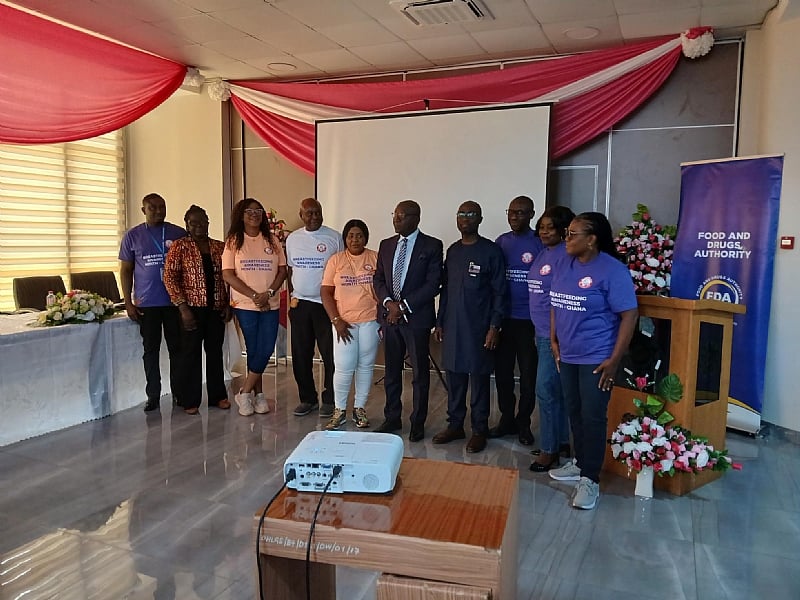Dr. Bernard Okoe-Boye, the Minister of Health in Ghana, has recently taken a significant step to address public awareness regarding the Legislative Instrument (LI) 1667, which is focused on breastfeeding. During an event commemorating the “2024 Breastfeeding Awareness Month,” he introduced a QR Code designed not only to educate the public about the LI but also to facilitate reporting of any violations relating to it. This legislative framework specifically prohibits the advertisement of products that could substitute for breast milk across various media, including television, radio, social media, and billboards. The designated products included under the LI encompass infant formulas, “follow-on” or “follow-up” formulas, and other food items intended for infants aged zero to six months. The LI emphasizes the importance of exclusive breastfeeding for the first six months of life and encourages continued breastfeeding with complementary foods for up to two years or longer.
The new regulations outlined by LI 1667 aim to create a protective environment for breastfeeding mothers and their infants. They strictly prohibit the provision of gifts or samples of designated products to health personnel and restrict manufacturers and distributors from offering any financial assistance or sponsorships. Healthcare facilities are also prevented from promoting these designated products within their premises. The regulations emphasize responsible labeling, mandating that condensed milk packaging carries clear warnings against its use for infant feeding. Dr. Okoe-Boye underscored breastfeeding as a public health priority that significantly reduces the risk of infectious diseases, fostering a strong bond between mother and child.
At the event, Dr. Okoe-Boye articulated the need for organizations to create conducive environments for nursing mothers by ensuring they have suitable spaces to breastfeed and flexible work schedules. He encouraged husbands to play supportive roles in their wives’ breastfeeding journeys, urging them to provide help, guidance, and overall postpartum support. This call to action was underscored by alarming statistics from a recent Ghana Demographic and Health Survey, which revealed that only 53% of new mothers exclusively breastfed their infants, indicating a substantial gap in breastfeeding practices that requires collective efforts to address.
Dr. Delese Mimi Darko, the Chief Executive Officer of the Food and Drugs Authority (FDA), spoke on behalf of the agency during the event. She highlighted critical findings from a UNICEF survey indicating that in 2017/2018, only 52% of newborns were breastfed within the first hour after birth, and only 43% of infants under six months were exclusively breastfed. The ambitious targets set for 2030 aim for 70% of newborns to be initiated on breastfeeding within the first hour, with 70% exclusivity for infants under six months, 80% at one year, and 60% at two years. She reaffirmed the necessity of collective action among stakeholders to attain these targets and improve breastfeeding rates in Ghana.
Dr. Darko pointed out that while breastfeeding is a natural process, many mothers face significant obstacles, particularly when trying to balance their careers and breastfeeding responsibilities. With limited maternity leave and a lack of supportive workplace environments, mothers often find it challenging to continue breastfeeding. Thus, it is crucial to identify and address these gaps to create a more supportive environment conducive to breastfeeding.
To tackle the prevalent ignorance regarding LI 1667, the FDA introduced a sub-theme for the Breastfeeding Awareness Month commemoration, titled “Intensify Awareness, Monitoring and Sanction Regimes of Legislative Instrument (LI) 1667.” This initiative aims to enhance regulatory compliance within the food environment for infants by addressing issues like improper marketing of designated products, the distribution of free samples, and violations of labeling requirements. Through these measures, the authorities intend to reinforce efforts to promote optimal breastfeeding practices across the country and ensure that both mothers and infants benefit from a supportive and well-regulated feeding environment.
In summary, the launch of the QR Code by Minister Dr. Okoe-Boye epitomizes a multi-faceted approach to bolster breastfeeding practices in Ghana while promoting awareness of LI 1667. The emphasis on community support, the need for conducive workplace environments, and the robust regulatory framework highlights the government’s commitment to prioritizing maternal and child health. The collaborative efforts among various stakeholders, including healthcare providers, governmental bodies, and families, are critical to overcoming the challenges surrounding breastfeeding practices and achieving the desired health outcomes for the nation’s children. As Ghana embarks on this journey of enhancing breastfeeding support, the importance of sustained advocacy, education, and compliance with health policies will be vital in closing the gaps and fostering a healthier future for its youngest citizens.














